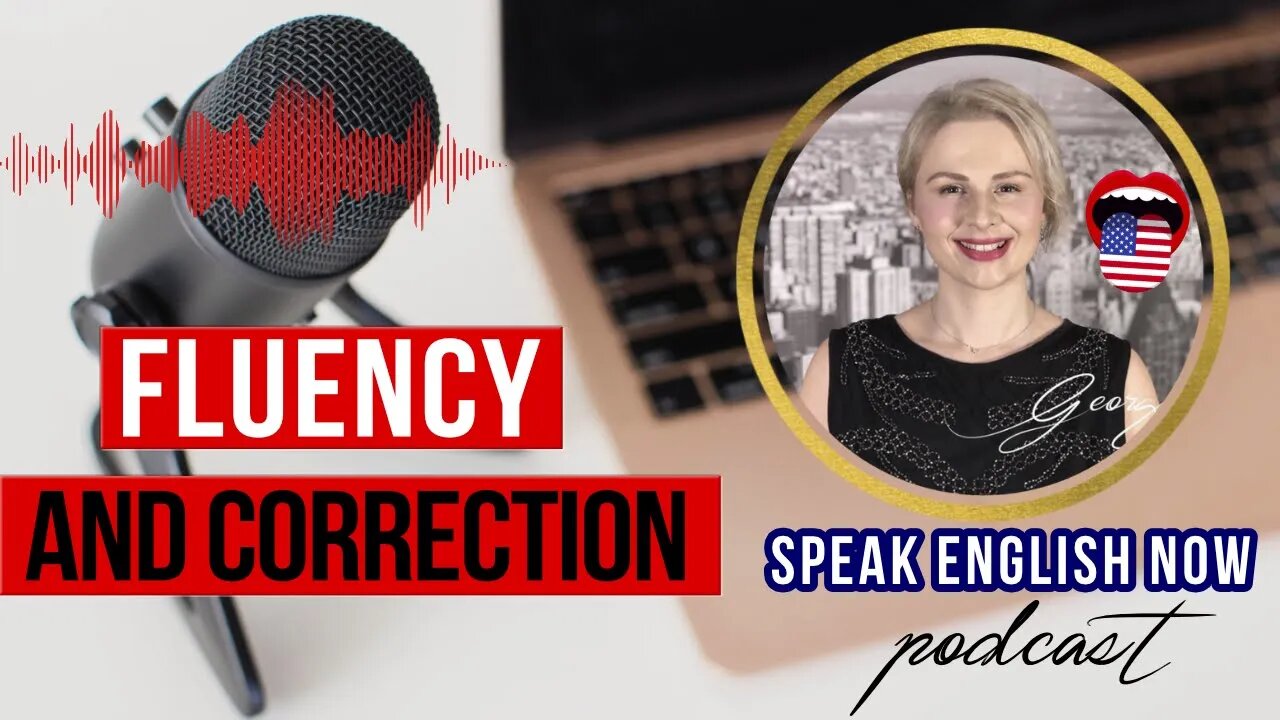Premium Only Content

239 Fluency and Correction when Speaking English
239 Fluency and Correction when Speaking English
Get the transcript here: https://SpeakEnglishpodcast.com/podcast
Today, I’d like to take a closer look at a common issue faced by many learners of English: the proper usage of various verb tenses, as well as the potential mistakes they can make.
First, you should bear in mind that native speakers tend to use fewer verb tenses when speaking compared to when they are writing.
In other words, spoken language is more direct and simple. And that’s good news!
So, why does this happen?
We can consider how to articulate our ideas best, select suitable grammar structures, and more when writing. However, when speaking, there is no time to think about how to construct a sentence.
Secondly, when learning a language, there is often a conflict between two components.
These two elements are fluency and self-correction.
By fluency, I mean the ability to produce the language with few pauses, and by self-correction, I mean the perception that what you are saying may be wrong, and consequently, you self-correct.
To illustrate this point, let’s assume that Tom is an English learner with a low level of fluency.
Tom has to make a significant effort to find the right words, finish sentences, and so on. He is probably mentally translating from his native language to English and the other way around.
While Tom is in a conversation, struggling to finish sentences, the last thing Tom can think about is whether he is making any grammar errors. It’s hard enough trying to keep the conversation going.
If Tom wants to reduce the number of errors, he will need to pause frequently for several seconds to ponder the best way to express himself. Even so, he will make mistakes.
This last scenario is quite common in traditional language schools. Teachers often require students to speak from the beginning without errors, even if they can barely articulate sentences. Consequently, this hinders fluency, preventing students from relaxing and enjoying basic conversations.
So, what is the solution? The key is to follow the natural process of language acquisition.
First, you need to listen many times to the same language patterns so that they become automatic in your mind. This way, you can gradually focus on making fewer mistakes. That’s why I often insist you should be listening to simple content repeatedly.
When you are fluent, you have the intuition that something sounds right. This happens because you have heard the same language patterns thousands of times.
In short, to gain mastery of the various verb tenses used in conversations and reduce mistakes, the key is to cultivate fluency.
-
 10:37
10:37
Speak English podcast with teacher Georgiana
1 year ago249 Zoom Business Meetings in English
224 -
 1:08:20
1:08:20
Man in America
10 hours ago🇨🇳 RedNote: A CCP Trojan Horse Deceiving Americans? w/ Levi Browde
22K18 -
 LIVE
LIVE
I_Came_With_Fire_Podcast
13 hours agoTrump SABOTAGE, LA FIRE CHIEF SUED, and BIDEN’S LAST F-U!
350 watching -
 2:59:47
2:59:47
Joker Effect
4 hours agoUkraine in a video game? Hardest thing I have done. S.T.A.L.K.E.R.2 Heart of Chornobyl,
56.1K4 -
 1:15:22
1:15:22
Flyover Conservatives
1 day agoEczema, Brain Fog, B.O., and Gas… Eating Steak and Butter Creates Ultimate Health Hack - Bella, Steak and Butter Gal | FOC Show
46.2K2 -
 51:58
51:58
PMG
8 hours ago $1.14 earned"Can the Government Learn from Elon Musk’s 70% Labor Cut? A Deep Dive into Inefficient Agencies"
25.7K -
 6:39:15
6:39:15
Amish Zaku
7 hours agoRumble Spartans #10 - New Year New Maps
28.9K2 -
 1:04:58
1:04:58
In The Litter Box w/ Jewels & Catturd
1 day agoNo Tax On Tips! | In the Litter Box w/ Jewels & Catturd – Ep. 722 – 1/17/2025
149K32 -
 5:35:39
5:35:39
Dr Disrespect
14 hours ago🔴LIVE - DR DISRESPECT - WARZONE - CRAZY CHALLENGES
167K33 -
 1:16:30
1:16:30
Edge of Wonder
10 hours agoLA Fire Updates: Miracles Amidst the Devastation
42K13